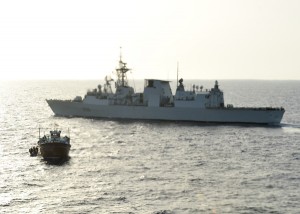HMCS Charlottetown intercepts narcotics shipment
By Lookout on May 14, 2012 with Comments 0

HMCS Charlottetown looms in the background as a boarding party team comes alongside a dhow boat after a ScanEagle Unmanned Arial Vehicle spotted a suspicious cargo exchange between the boat and another skiff.
The pipe echoed throughout HMCS Charlottetown.
A small boat in the vicinity of the Canadian warship was suspected of illegal activity, and the ScanEagle Unmanned Arial Vehicle (UAV) was being sent to investigate.
On May 5, during its first couple of days operating with Combined Task Force 150 (CTF150), Charlottetown successfully intercepted a narcotics shipment in the Gulf of Aden, and the UAV played a key role in the operation.
“The patrol area is difficult to search because it is so vast – 2.5 million square miles of international waters,” said Lt(N) Ian Bilodeau, Above Water Warfare Officer on Charlottetown. “The vessels that we are searching for are so small they can be difficult to pick up on our radars – it’s like searching for a needle in a haystack. However, the UAV – with its incredible stealth and operating endurance – was able to covertly look at a large piece of the haystack, zoom in with incredible detail and determine that a vessel was suspicious.”
The UAV located the skiff (smaller boat typically with an outboard motor) and gave command eyes on the contact to make an assessment of suspicious activity. Charlottetown’s CH-124 Sea King was sent to search and locate the dhow (larger fishing-type vessel commonly used for transporting goods in the region) to continue to investigate the developing situation.
“When the ship gave us permission to go overt and proceed to the vessels they were already exchanging packages,” said Maj David Holmes, Air Officer on the ship and one of the pilots who was flying during the operation. “We gathered intelligence and then the vessels left in opposite directions.”
The skiff continued on a course towards Charlottetown when it realized it was heading toward a warship, the crew began rapidly dumping the cargo. The helicopter was able to retrieve two packages from the water and Charlottetown’s rigid-hulled-inflatable boat retrieved the remaining eight packages. All packages contained a total of 270 kilograms of hashish.
Later, Charlottetown conducted a boarding on the suspicious dhow. The boarding team established the vessel to be stateless and carried on with an extensive search of the vessel under Canadian Law.
“By being here we are making a difference,” emphasizes Cdr Wade Carter. “Ninety per cent of global trade is conducted by sea. The world depends on maritime shipping to transport vital supplies such as food and fuel. Operations such as these help ensure that maritime security is maintained by ensuring that profit isn’t made by harmful substances and that these activities do not become a conduit for facilitating terrorism.”
This year alone, CTF 150 has seized nearly 700 kilograms of illegal narcotics with an estimated value of nearly $50 million. “Although our mission here is much the same as it was in the Med – to participate in maritime security and counter-terrorism – we’re now in a tougher neighbourhood,” said Cdr Carter. “I’m proud of how my crew reacted to this drug interdiction operation. They put their training to the test and executed our plan seamlessly.”
U.S. Navy Captain John Carter, Chief of Staff, Combined Maritime Forces (CMF) commented, “As a CTF-150 asset, HMCS Charlottetown unquestionably demonstrated the awesome and cohesive reach that a 26-nation maritime partnership can achieve in support of preserving the inviolate security of the globes critical sea lines of communication, and deterring and disrupting the illegal narcotics trade.”
Charlottetown deployed from Halifax, on Jan 8. From Jan 24 until April 20, she operated with NATO allies participating in Operation Active Endeavour in the Mediterranean Sea. Recently, Charlottetown was re-tasked to new area of operation and began working with CTF 150, one of three Task Forces within CMF.
CMF is a multi-national naval partnership, which exists to promote security, stability and prosperity across approximately 2.5 million square miles of international waters in the Middle East, which encompass some of the world’s most important shipping lanes. The presence of Charlottetown in the Arabian Sea region operating with CTF 150 also gives Canada the flexibility and capability to respond quickly to emerging crises in the region.
Lt(N) Jessica MacDonald, HMCS Charlottetown, “UAV flying stations”
Filed Under: Top Stories
About the Author:





